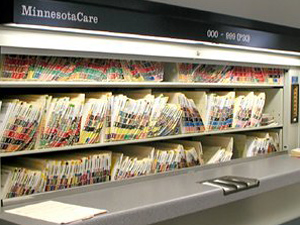January 12, 2005
 |
| Case files are a testament to the popularity of Minnesota's MinnesotaCare program. (Office of the Legislative Auditor photo) |
St. Paul, Minn. — Jan Dechampeau, who manages a video store in Bemidji, has been enrolled in MinnesotaCare for about 18 years because her employer doesn't offer health insurance. When she had knee surgery last year, she assumed MinnesotaCare would pay for the surgery. Instead, she got bills of more than $10,000, because she had already reached the $5,000 limit with doctor visits and medication.
"I don't know how I'm going to manage," she says. "I'm going to have to call the hospital, the clinic, all these different places and try to make some payment arrangement to send a little to each one."
Dechampeau says she could switch to another government program, Medical Assistance, which doesn't cap benefits. But she says she likes being on MinnesotaCare, where she pays premiums of $50 a month. She says she wants to pay what she can for health coverage.
Dechampeau's story is not unique, according to Kathy McDonough, an attorney with the Legal Services Advocacy Project.
"We're seeing many people who are in dire situations where they can't get the health care they need and it's life-threatening. Or they may end up having to go to the hospital emergency room because their condition gets much worse because they can't afford the medications or the care that they need," she says.
McDonough supports legislation to eliminate the $5,000 cap on outpatient services. The bill's sponsor, DFL Sen. Linda Berglin of Minneapolis, says the cap was a bad idea.
"These people are paying premiums. They're doing everything they can to be responsible and make sure they get the least-costly services, and they're paying what they can afford for the services. We should make sure we do the rest and not put them in a situation where they could be at risk for losing their life or damaging their health or ending up in the hospital," Berglin says.
Berglin estimates that 1,000 to 2,000 Minnesotans have bumped up against the MinnesotaCare cap. About 145,000 people are enrolled in the program.
The chair of the House Health Policy and Finance Committee, Republican Fran Bradley of Rochester, says the cap is fair, in light of Minnesota's budget situation.
"Keep in mind that MinnesotaCare was never intended to be a full comprehensive. It already has a $10,000 cap on hospitals, so inpatient already had a cap. So it's not illogical. Now, if you had an infinite amount of money, you wouldn't have to do these things; none of us would probably do it," according to Bradley.
Minnesota faces a projected $700 million deficit in the next two-year budget cycle. At the same time, the fund that pays for MinnesotaCare is projected to have a $226 million surplus. Money in that health care access fund comes from a tax on doctors, hospitals and clinics. Berglin wants to use some of that surplus to pay for her bill, which will cost an estimated $69 million.
"That is what the money is meant for; it's meant to serve the people in the program. We don't need to be rationing services like this, we have the money and we should make sure that we provide the services," Berglin says.
Republican leaders want to use the surplus in the health care access fund to help balance the overall state budget. The fastest growing area of the state budget is health care. State Human Services Commissioner Kevin Goodno says if the surplus goes back into the state's general fund, it would pay for other health care programs.
"The money isn't being taken out of the health care access fund to solve road problems; it's being taken out of the health care access fund to solve health care cost problems. And so it is being spent on health care," he says.
When Gov. Pawlenty releases his budget later this month, it's likely he'll recommend using the surplus in the health care access fund to help balance the budget. Berglin and other Senate DFLers say they'll strongly oppose efforts to do that.






